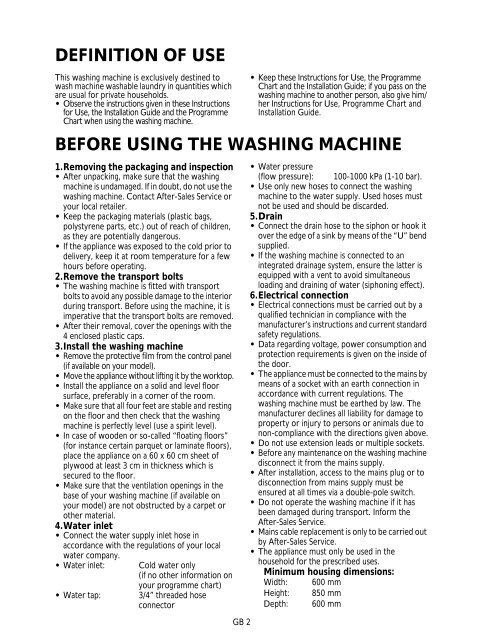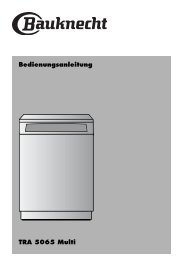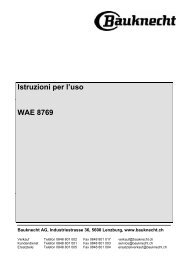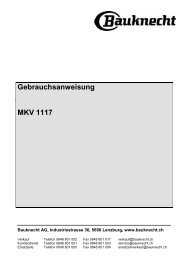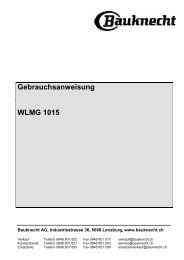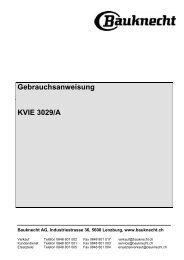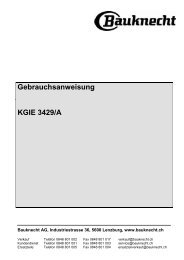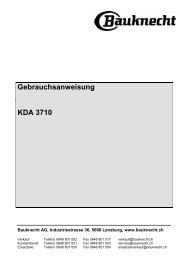Instructions for use WAE 7749 - Bauknecht
Instructions for use WAE 7749 - Bauknecht
Instructions for use WAE 7749 - Bauknecht
Create successful ePaper yourself
Turn your PDF publications into a flip-book with our unique Google optimized e-Paper software.
DEFINITION OF USE<br />
This washing machine is exclusively destined to<br />
wash machine washable laundry in quantities which<br />
are usual <strong>for</strong> private ho<strong>use</strong>holds.<br />
• Observe the instructions given in these <strong>Instructions</strong><br />
<strong>for</strong> Use, the Installation Guide and the Programme<br />
Chart when using the washing machine.<br />
GB 2<br />
Keep these <strong>Instructions</strong> <strong>for</strong> Use, the Programme<br />
Chart and the Installation Guide; if you pass on the<br />
washing machine to another person, also give him/<br />
her <strong>Instructions</strong> <strong>for</strong> Use, Programme Chart and<br />
Installation Guide.<br />
BEFORE USING THE WASHING MACHINE<br />
1.Removing the packaging and inspection<br />
After unpacking, make sure that the washing<br />
machine is undamaged. If in doubt, do not <strong>use</strong> the<br />
washing machine. Contact After-Sales Service or<br />
your local retailer.<br />
Keep the packaging materials (plastic bags,<br />
polystyrene parts, etc.) out of reach of children,<br />
as they are potentially dangerous.<br />
If the appliance was exposed to the cold prior to<br />
delivery, keep it at room temperature <strong>for</strong> a few<br />
hours be<strong>for</strong>e operating.<br />
2.Remove the transport bolts<br />
The washing machine is fitted with transport<br />
bolts to avoid any possible damage to the interior<br />
during transport. Be<strong>for</strong>e using the machine, it is<br />
imperative that the transport bolts are removed.<br />
After their removal, cover the openings with the<br />
4 enclosed plastic caps.<br />
3.Install the washing machine<br />
Remove the protective film from the control panel<br />
(if available on your model).<br />
Move the appliance without lifting it by the worktop.<br />
Install the appliance on a solid and level floor<br />
surface, preferably in a corner of the room.<br />
Make sure that all four feet are stable and resting<br />
on the floor and then check that the washing<br />
machine is perfectly level (<strong>use</strong> a spirit level).<br />
In case of wooden or so-called “floating floors”<br />
(<strong>for</strong> instance certain parquet or laminate floors),<br />
place the appliance on a 60 x 60 cm sheet of<br />
plywood at least 3 cm in thickness which is<br />
secured to the floor.<br />
Make sure that the ventilation openings in the<br />
base of your washing machine (if available on<br />
your model) are not obstructed by a carpet or<br />
other material.<br />
4.Water inlet<br />
Connect the water supply inlet hose in<br />
accordance with the regulations of your local<br />
water company.<br />
Water inlet: Cold water only<br />
(if no other in<strong>for</strong>mation on<br />
your programme chart)<br />
Water tap: 3/4” threaded hose<br />
connector<br />
Water pressure<br />
(flow pressure): 100-1000 kPa (1-10 bar).<br />
Use only new hoses to connect the washing<br />
machine to the water supply. Used hoses must<br />
not be <strong>use</strong>d and should be discarded.<br />
5.Drain<br />
Connect the drain hose to the siphon or hook it<br />
over the edge of a sink by means of the “U” bend<br />
supplied.<br />
If the washing machine is connected to an<br />
integrated drainage system, ensure the latter is<br />
equipped with a vent to avoid simultaneous<br />
loading and draining of water (siphoning effect).<br />
6.Electrical connection<br />
Electrical connections must be carried out by a<br />
qualified technician in compliance with the<br />
manufacturer’s instructions and current standard<br />
safety regulations.<br />
Data regarding voltage, power consumption and<br />
protection requirements is given on the inside of<br />
the door.<br />
The appliance must be connected to the mains by<br />
means of a socket with an earth connection in<br />
accordance with current regulations. The<br />
washing machine must be earthed by law. The<br />
manufacturer declines all liability <strong>for</strong> damage to<br />
property or injury to persons or animals due to<br />
non-compliance with the directions given above.<br />
Do not <strong>use</strong> extension leads or multiple sockets.<br />
Be<strong>for</strong>e any maintenance on the washing machine<br />
disconnect it from the mains supply.<br />
After installation, access to the mains plug or to<br />
disconnection from mains supply must be<br />
ensured at all times via a double-pole switch.<br />
Do not operate the washing machine if it has<br />
been damaged during transport. In<strong>for</strong>m the<br />
After-Sales Service.<br />
Mains cable replacement is only to be carried out<br />
by After-Sales Service.<br />
The appliance must only be <strong>use</strong>d in the<br />
ho<strong>use</strong>hold <strong>for</strong> the prescribed <strong>use</strong>s.<br />
Minimum housing dimensions:<br />
Width: 600 mm<br />
Height: 850 mm<br />
Depth: 600 mm


